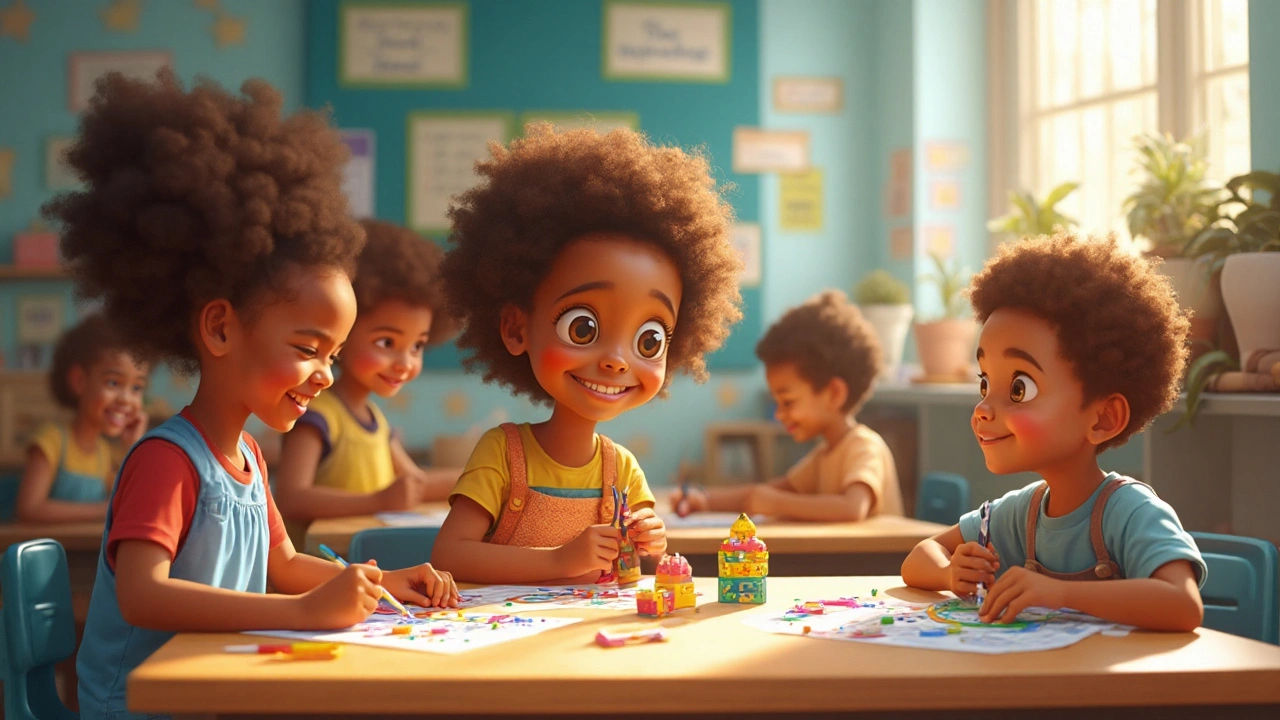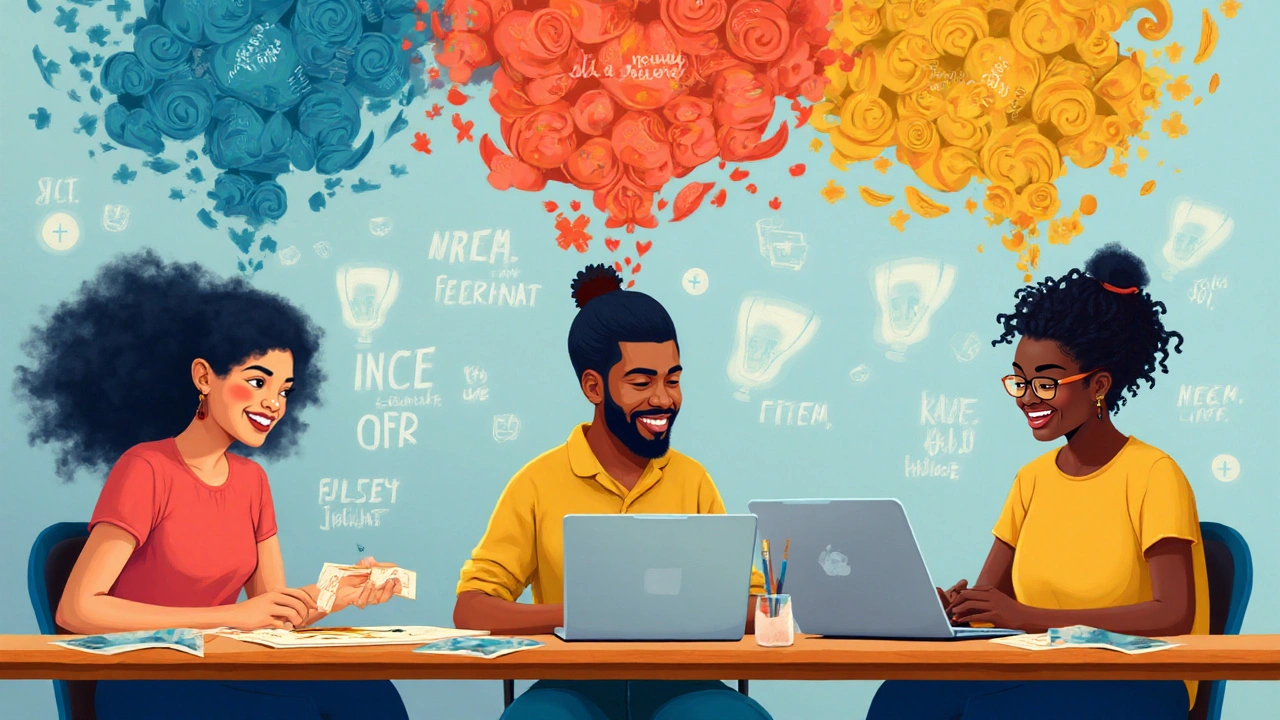Neurodiversity and Autism: Embracing Unique Strengths and Abilities

Sometimes the world gets it all wrong about what it means to be different. People tend to focus on what doesn’t fit—what’s "unusual"—instead of asking, what strengths are hiding in plain sight? If you’ve ever wondered why someone might remember every car model since the ‘80s, do mental math faster than a calculator, or see patterns no one else notices, you’re actually bumping into neurodiversity in action. Autism, one of the most misunderstood types of neurodivergence, isn’t just about obstacles or challenges. It’s packed with hidden strengths that can blow past the so-called "norm." We’re not just talking about trivia whizzes, but also artists, code-breakers, musicians, and problem-solvers who view the world through an entirely different—and often brilliant—lens. The trick? We need to stop trying to fit unique minds into one-size-fits-all boxes and start appreciating what’s already there.
What Is Neurodiversity and Why Does It Matter?
We’re not wired the same. That’s both obvious and a lot deeper than most people realize. "Neurodiversity" is a term that says, look, there are lots of different ways a brain can work, and none of them is the gold standard. The phrase was coined by sociologist Judy Singer back in the late ‘90s after she noticed how differences like autism, ADHD, and dyslexia were being pathologized instead of understood. Instead of thinking of these as "faulty wiring," the idea is that human brains just operate along a spectrum, and every variation adds something valuable.
For decades, autism has been shoved into the category of "disorder"—treated like a list of symptoms to correct, an obstacle to overcome. But once you really grasp neurodiversity, you see the problem: if you’re always searching for what’s broken, you’re going to miss what’s extraordinary. It flips the narrative: autistics aren’t failed versions of "normal." They’re full versions of themselves, with strengths and weaknesses like anyone else—just distributed differently.
What does this mean in real life? Think about schools that try to squeeze every student through the same pipeline. Or workplaces where "team player" actually means "acts like everyone else." If we recognize neurodiversity, environments can stop being exclusion zones and start being places where people thrive by being themselves. A 2022 research review led by Dr. Julia Cook (published in Developmental Medicine and Child Neurology) found that when classrooms adapt to neurodiverse students, everyone does better—test scores, social skills, engagement. It breaks out of old-school molds. Suddenly, being good at details, thinking visually, or needing to fidget in meetings isn’t "bad behavior"—it’s just a difference, and it can be an advantage.
Is it perfect? Of course not. No one’s saying autism—or any form of neurodivergence—is all superpowers and glitter. Extra sensitivity to noise, struggles with communication, intense or unusual interests: these are also part of the package. But when society recognizes and values the strengths that come alongside challenges, things get a lot more fair and a lot more interesting.
There’s a popular saying in the autistic community: "Nothing about us without us." Neurodiversity isn’t an abstract idea; it’s about real people having a real say in their lives, their education, and their futures. Listening to autistic voices has led to more honest depictions in books, movies, and even policies. Instead of stories written for inspiration porn, authentic narratives—like the Netflix series "Atypical" or Temple Grandin’s life story—show what thriving looks like from the inside. The message is clear: different brains make the world more whole, not less.

Unique Strengths in Autism: The Surprising Benefits Few People Talk About
Forget what you’ve heard about "lacking empathy" or "rigid thinking." The reality about autistic strengths is more interesting, and surprisingly practical. People on the spectrum aren’t replicas—they’re originals, and a lot of their so-called quirks are just skills waiting for the right setting.
First up: pattern recognition. Some autistic people spot irregularities in data in seconds, making them natural coders, puzzle-solvers, or even crime-scene analysts. SAP, the global software giant, didn’t just talk about neurodiversity—they hired hundreds of autistic adults because, in their own words, they "see and solve problems differently," leading to major boosts in productivity and creative breakthroughs on actual software projects.
Memory is another mind-blower. While not every autistic person has photographic recall, there’s solid evidence for amazing rote memory skills. Case in point: a 2023 study out of the University of Edinburgh showed that participants with autism could recall lists of facts, numbers, and even passages of text months after exposure—without using traditional memorization tricks. That kind of ability doesn’t just make you a quiz team legend; it’s a huge asset in everything from research to music composition.
But let’s get personal. Sensory sensitivity, like finding fluorescent lights or scratchy tags unbearable? It doesn’t sound like a superpower—until you realize this attention to detail is the same hyper-awareness that makes autistics incredible at quality control, art, and even environmental science. Artists like Stephen Wiltshire, who can draw entire cityscapes from memory after a single helicopter ride, show the upside of a brain that never stops taking things in.
Deep focus, or what’s sometimes called "hyperfocus," is another misunderstood strength. When autistic people are interested, distraction drops away, and the result can be hours of obsessive work that others struggle to match. Dr. Temple Grandin, probably the world's most famous autistic advocate, designed cattle-handling facilities by drawing blueprints in her head, obsessively perfecting each step. She’s said, "If I didn’t have autism, I wouldn’t be as good at what I do." That’s not an outlier—that’s a pattern in tech, design, and engineering, where attention to detail saves time and money.
Then you run into honesty and straightforward communication. The stereotype that autistics "lack a filter" ignores the upside: you get the truth every time, with zero hidden agendas. In an age where people dodge direct answers, many employers and families have come to value that honesty and loyalty as a breath of fresh air.
Some autistic folks are also incredible at logistics, organization, and routines. What looks like "repetitive behavior" to outsiders can be a genius system for efficiency. Think about science, where experiments demand the same procedure every time, or public transit, where timing has to be exact. What feels odd in day-to-day life becomes a genuine asset in the right place.
Strength doesn’t always look like a superpower either. Sometimes it’s the resilience learned from navigating a world that wasn’t made for you. Autistic adults, surveyed by the nonprofit AchieveAbility in 2024, named "problem-solving," "creative adaptation," and "determination" among their top attributes—skills that come from living differently, not in spite of it.
Want to help an autistic friend or colleague shine? Start by scrapping assumptions. Ask what they need instead of guessing. Some might communicate best in writing, need a quiet break room, or want extra info before a big meeting. A simple question—"Is there a better way we can do this for you?"—can open the door to strengths you didn’t even know existed.

Making Spaces That Welcome Neurodiversity: Simple Changes, Big Wins
It’s time to quit treating inclusion like a buzzword and start treating it like a game plan. You don’t have to redesign your entire workplace or classroom to make autistic people feel at home. A few concrete tweaks can make all the difference, and often, they help everyone, not just those on the spectrum.
Lighting and sound are top of the list. Autistic people aren’t "making a fuss" when they object to noisy spaces or flickering lights—there’s real science behind it. Their brains process sensory information differently, and what’s just background for most can be overwhelming. Try offering noise-cancelling headphones, giving access to calm down zones with soft light, or letting people wear hats and sunglasses inside. Schools that switched to LED lighting and sound-dampening panels saw higher focus and fewer meltdowns—not just for neurodivergent students but for everyone.
Communication is another big one. People aren’t mind-readers, so use plain language and spell out steps. Adding visual supports—like checklists, diagrams, or color-coded schedules—boosts clarity. Some companies make agendas available before meetings and skip "open brainstorming" in favor of letting people submit ideas in writing first. That way, everyone, especially those who process information differently, can contribute without pressure.
Routine and predictability might sound boring, but for *autism*, it’s often the engine of success. People tend to perform better when they know what’s coming next. Keeping schedules consistent, warning about changes, and making transitions gradual all help. Trailblazer Microsoft even includes "quiet hours" in its offices, with no meetings and minimal interruptions. Staff say it not only helps neurodiverse colleagues, but also boosts productivity across the board.
Allies make a difference. Teachers who listen when students say, "I need to move while I learn," or managers who allow flexible work setups show that policies can bend without breaking. Starbucks has stores experimenting with "quiet ordering"—orders taken via app or written notes for customers who find speaking tough. It’s not just a service tweak; it’s dignity in action.
On the ground, inclusion means giving autistic voices a seat at the table when decisions happen. That means more advisory committees with neurodivergent members, more workshops where people share their lived experiences, more input from the actual communities affected. According to an August 2025 survey by the UK’s National Autistic Society, organizations with neurodivergent co-design teams report higher morale, better innovation, and lower staff turnover.
For families, there’s relief in knowing small shifts have an outsize impact: practicing social scripts at home, previewing new places with photos, or giving choices around food and activities lets autistic kids build independence at their own pace. Tips for friends? Try being direct, skip sarcasm, and offer clear invitations instead of vague plans.
There’s no one "right" way to support neurodivergent folks—but there are an awful lot of good ways. The golden rule is simple: ask instead of assuming, listen before responding, and trust that different doesn’t mean less. Too many potential game-changers have quit before starting because their environment said "adapt or leave." Why not create spaces that let everyone lead with their strengths?
patrick sui
August 6, 2025 AT 19:13Neurodiversity isn't just a buzzword-it's a paradigm shift. The way we've pathologized difference for decades is frankly colonial in its thinking: one brain as the gold standard, everyone else as defective. SAP's hiring initiatives? That's not charity, that's ROI-driven cognition. Autistic employees don't just "fit in"-they rewire the problem-solving architecture of entire teams. We're talking about hyperfocus as a productivity multiplier, pattern recognition as a predictive analytics superpower. Stop framing this as accommodation. Frame it as evolutionary advantage.
And yes, sensory sensitivities? That's not "overreacting"-that's a neurological firewall. LED lighting, noise-cancelling headphones, written agendas-these aren't "special treatments," they're baseline ergonomic standards for human cognition. We wouldn't ask a blind person to read tiny font without assistive tech. Why treat neurodivergent minds differently?
Conor Forde
August 7, 2025 AT 17:05Oh here we go again with the "autistic geniuses" narrative. You know what else has "hidden strengths"? Serial killers. They’re super focused! And hey-some of them have amazing memory too. Maybe we should stop romanticizing neurodivergence and admit that a lot of these "superpowers" are just side effects of social dysfunction. Also, "nothing about us without us"? Cool, but what about the autistic people who want to be cured? Are they less valid? 🤔
Declan O Reilly
August 8, 2025 AT 13:32Bro. I used to think autism was just "weird math kids"-until I met my cousin. He can’t hold eye contact but he built a working drone from scrap parts at 14. He didn’t need a manual. He just… saw how it *should* work. That’s not a disorder. That’s a different operating system. And yeah, fluorescent lights make him cry. But guess what? So do I. Turns out, we’re all just slightly broken in different ways. Maybe the real disorder is pretending everyone’s wired the same.
Stop trying to fix people. Start building worlds where they don’t need fixing.
Linda Migdal
August 9, 2025 AT 22:27Look, I support inclusion, but this "neurodiversity movement" is becoming a cult. We’re not talking about civil rights here-we’re talking about excusing anti-social behavior under the guise of "difference." Why should I have to whisper in an office because someone can’t handle normal noise? Why should schools lower standards because a kid can’t sit still? This isn’t diversity-it’s capitulation. We used to teach resilience. Now we redesign the world for comfort.
Tommy Walton
August 10, 2025 AT 17:16Bro, the real flex? Being autistic and still building billion-dollar startups. 🤯 Temple Grandin didn't need a hug-she needed blueprints. And SAP? They didn't hire autistic people to be "nice." They hired them because they're the only ones who can see the bugs in the matrix. Normal people see a spreadsheet. Autistic people see the *pattern* behind the numbers. That's not a disability. That's a cheat code. 🚀🧠
Louise Girvan
August 10, 2025 AT 22:41Wait-so now we’re saying autism is a superpower? But the CDC says 1 in 36 kids are diagnosed. That’s not evolution-that’s a pharmaceutical epidemic. Who benefits? The therapists. The schools. The nonprofits. The companies selling sensory toys. The media loves a tragic-hero narrative. But what if the real issue is that we’re over-diagnosing normal childhood quirks as "neurodivergence"? What if the world is just getting more chaotic, and we’re pathologizing adaptation?
And why are we ignoring the fact that most autistic adults are unemployed? Because no one wants to work with someone who can’t make small talk. You can’t build a team on hyperfocus alone.
Sean McCarthy
August 11, 2025 AT 17:14Let's cut the fluff. Autism is a disability. It's listed in the DSM. It's covered under the ADA. Calling it a "strength" is dangerous. Some people can't speak. Some can't hold a job. Some need constant care. You can't romanticize that. The world needs structure. Not every difference is a gift. Some are burdens. And pretending otherwise hurts the people who actually need help.
Jaswinder Singh
August 13, 2025 AT 01:06bro i work in a software team with 3 autistics and let me tell u-its like having 3 chess grandmasters who never talk but fix 80% of the bugs no one else sees. one guy once spotted a logic error in our payment system just by looking at the logs for 30 seconds. no one else even noticed it was broken. they dont need to be "fixed"-they need space. and yeah, they hate meetings. so we send agendas ahead and let them reply in writing. boom. 3x faster decisions. stop acting like their brain is broken. it’s just… different firmware.
Bee Floyd
August 14, 2025 AT 22:36I’ve worked with autistic colleagues for over a decade. The thing no one says? They’re the quiet ones who show up early, stay late, and never take credit. They don’t need praise. They don’t need team-building retreats. They just need clear expectations and a quiet corner. I used to think I was being "inclusive" by making accommodations. Turns out, I was just being human. We all have thresholds. Some of us just have louder ones. Maybe the real lesson isn’t about autism-it’s about how little we’ve bothered to design for actual humans.
Jeremy Butler
August 16, 2025 AT 13:16It is axiomatic that the epistemological framework underpinning the neurodiversity paradigm is fundamentally incompatible with the biomedical model of pathology. While the sociopolitical implications of this paradigm shift are indeed profound, one must not conflate ontological difference with normative value. The assertion that autistic cognition constitutes an "advantage" is, in the absence of longitudinal, controlled studies, a fallacy of composition. Furthermore, the conflation of individual anecdotal success with systemic efficacy constitutes an appeal to anecdote-a logical fallacy of considerable magnitude.
Eric Vlach
August 16, 2025 AT 19:57My kid is autistic. He doesn't like hugs. He hates loud music. He can recite every train schedule in the country since 1987. He also designed a better bus route for our town using a spreadsheet and a map. I used to think he was "too quiet". Now I know he was just thinking. Stop trying to make him normal. Just give him space to be brilliant. And if you're a manager? Stop asking him to "socialize". Ask him what he needs. He'll tell you. And you'll be shocked at how simple it is.
Priyam Tomar
August 17, 2025 AT 09:08Oh please. You think autistic people are all Einsteins? Most of them can't tie their shoes. And why are we always talking about the ones who succeed? What about the ones who sit at home for 15 years because no one will hire them? You think companies hire them because they're brilliant? No-they do it for PR. They get tax breaks and media points. Meanwhile, the real autistic people? They're still struggling to get a job, a friend, a bathroom that doesn't scream at them. Stop turning autism into a TED Talk.
Jack Arscott
August 17, 2025 AT 12:51My coworker once drew the entire skyline of Tokyo from memory after a 10-minute flight over it. 🤯 I didn’t believe him until I saw the sketch. Then I realized-he didn’t just see buildings. He saw structure. Pattern. Geometry. That’s not magic. That’s his brain. And yeah, he wears noise-canceling headphones at all times. So do I now. Because honestly? The office is too loud. Maybe we’re all a little autistic. Maybe the world just got too loud for everyone.
Irving Steinberg
August 17, 2025 AT 14:01Look I get it. I’m not saying neurodivergent people aren’t cool. But why does every article have to sound like a corporate diversity video? "Empower their strengths!" "Celebrate their differences!" Meanwhile, their parents are crying because they can’t find a school that won’t kick them out. And the autistic adults? They’re just trying to survive. Stop making it about inspiration porn. Start making it about real support. Like, you know, funding. Housing. Jobs. Not just "quiet hours" and glittery posters.